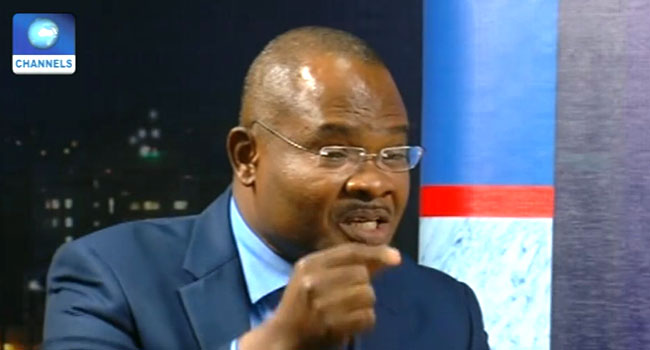It’s Unconstitutional For Military To Monitor Nigerians On Social Media – Lawyer
 Clement Nwankwo
Clement Nwankwo
A legal practitioner and rights activist, Mr Clment Nwankwo, says it is unconstitutional for the Nigerian Military to monitor Nigerians on the social media.
Nwankwo believes such move clearly violates the law that sets up the military, stating that its responsibility is to defend Nigeria’s territorial integrity.
The Director of Defence Information, Major-General John Enenche, had told Channels Television on Tuesday last week that the military was monitoring the activities of Nigerians on the social media for hate speech, anti-government and anti-security information.
Reacting to this when he appeared on Politics Today on Monday, Nwankwo said, “It’s very clear what the constitution says; the right to free expression, the right to disseminate and impart knowledge, and the right for people to speak.”
“The Constitution, however, has its claw-back provisions; whether in Section 39 or even Section 45 of the Constitution which provides exceptions. Now those exceptions relate only to public order, public security and in the interest of the citizenry and the nation.
“It is not the responsibility or the duty of the military to get into a space that is not within the law that sets it up. The military has the responsibility to defend the territorial integrity of the country, or where called upon to maintain law and order by civilian security authorities,” he explained.
The legal practitioner said it is a widespread apprehension to monitor phone calls and text messages across the country, saying even some individuals and public office holders have already engaged in such activities.
“Having said this, I think that it’s widespread apprehension in this country that every single telephone call that anybody makes, including text messages that are sent, are recorded and held in custody of certain authorities.
“And if you look at the Nigerian Communications Commission Act, it requires that providers who are licensed by the NCC to provide communications services should have the capacity to retain both voice and data exchanges that pass through their network. So I think it’s something that Nigerians need to know that even the law itself requires that these companies retain those powers.
“I must make the point that the overriding issues about access to the communications of all persons is whether the retention of it is in the interest of the nation or of the public but the same way, we have seen people or even the governors themselves acquiring equipment to have access to the private conversations of individuals.
“So it is a widespread abuse question. It is a worrying situation because there is the question to what extent technology and the powers of the state are being used to abuse the constitutionally guaranteed rights in Section 39 of the Constitution,” he said.
Nwankwo, however, advised the government to be even in tackling the promotion of hate speech in the country and also called for the strengthening of the nation’s legislation.
He also recommended that instead of the military monitoring Nigerians on the social media, government should prosecute those promoting hate according to the law.
“I think the key thing here is for government to be very even in the way it deals with people who preach hate crimes. So if you have some elements call Northern youths who threaten an entire ethnic group, government should not be in a press conference with them lifting a ban or lifting a ‘quit order’.
“The same thing if you have groups in the Southeast or in the Southwest who are busy profiling and attacking other ethnic groups, government needs to be very firm because ethnicity has become a major issue.
“If any persons promote hate through the social media, they should be brought to account within the existing law. The problem has been that government does not appear to be very even with the way it has handled this.


0 Comments:
Post a Comment
Subscribe to Post Comments [Atom]
<< Home